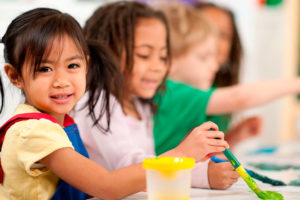
AFFECTIVE DEVELOPMENT
AFFECTIVE DEVELOPMENT
We first ensure that a special relationship is forged between the educator and the children for whom she is responsible.
This bond allows the child to fill a need for security, self-confidence and gives him or her momentum to discover the environment.
Meeting the child’s emotional needs is just as vital as meeting his or her physical needs (drinking, eating, moving, eliminating, and sleeping). Therefore, it is of the utmost importance to create a stable and secure emotional relationship with the child as soon as he or she enters the daycare service, since it is from this relationship that he or she can develop harmoniously. We seek to create a safe environment where the child can explore everything at his or her ease. A relationship of trust between the educator and the child remains essential to explore and discover the world.
AFFECTIVE DEVELOPMENT:
- The educator allows the child to develop his ability to express and control his emotions. For example, the educator will teach the child to name his or her emotions (e.g. say it with words, “I need help,” “you have the right to be angry”).
• The educator helps him or her develop his or her ability to handle changes and transitions (with aids such as sequential pictograms on the schedule for actions such as dressing or washing her hands).
• The educator helps build self-esteem. He or she offers a variety of activities and gives the child the opportunity to make choices and exploit his or her strengths.
• The educator congratulates the children when they succeed, displays their productions and encourages them to talk about their lives and experiences outside the daycare (through activities such as puzzle games, tinkering, coloring, stringing beads, cutting, and discussing in the morning).


